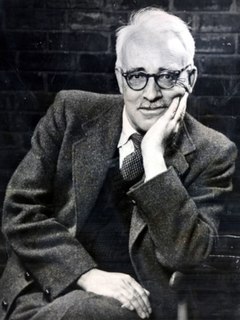A Quote by Phillip E. Johnson
In short, the proposition that God was in any way involved in our creation is effectively outlawed, and implicitly negated.
Quote Topics
Related Quotes
To make our position clearer, we may formulate it in another way. Let us call a proposition which records an actual or possible observation an experiential proposition. Then we may say that it is the mark of a genuine factual proposition, not that it should be equivalent to an experiential proposition, or any finite number of experiential propositions, but simply that some experiential propositions can be deduced from it in conjunction with certain other premises without being deducible from those other premises alone.
I am convinced that all our attempts to change the letter of the law and to reeducate people have been, and are, merely band-aid solutions for a fatal hemorrhage. The system will never change because our starting point is flawed. The secular view of man can neither give the grandeur that God alone can give, nor can it see the evil within the human heart that God alone can reveal and cure, for atheism implicitly denudes each individual of the grand image God has imprinted upon His creation.
More than anything else, kindness is a way of life. It is a way of living and walking through life. It is a way of dealing with all that is-our selves, our bodies, our dreams and goals, our neighbors, our competitors, our enemies, our air, our earth, our animals, our space, our time, and our very consciousness. Do we treat all creation with kindness? Isn't all creation holy and divine?
Now, which am I to believe, a book that any impostor might make and call the Word of God, or the creation itself which none but an Almighty Power could make? For the Bible says one thing; and the creation says the contrary. The Bible represents God with all the passions of a mortal, and the creation proclaims him with all the attributes of a God.
We grasp because God does. We create, and fall short, because God does. We continue creating because we fell short, and fall short again, because God does. Because one act of creation, one attempt at capture, is only one breath and we must breathe again. And again. And again. Here we stand (and sit and sleep), the many images of the Imager, and we can do no other.
God's revelation... unmasks our illusions about ourselves. It exposes our pride, our individualism, our self-centeredness - in short, our sin. But worship also offers forgiveness, healing, transformation, motivation, and courage to work in the world for God's justice and peace - in short, salvation in its largest sense.
What if one of the core elements of a radical Christianity lay in a demand that we betray it, while the ultimate act of affirming God required the forsaking of God? And what if fidelity to the Judeo-Christian scriptures demanded their renunciation? In short, what if the only way of finding faith involved betraying it with a kiss?
We cannot find God without God. We cannot reach God without God. We cannot satisfy God without God - which is another way of saying that all our seeking will fall short unless God starts and finishes the search. The decisive part of our seeking is not our human ascent to God, but His descent to us. Without God's descent there is no human ascent. The secret of the quest lies not in our brilliance but in His grace.
The dialectical or ecological approach asserts that creating the world is involved in our every act. It is impossible for us to operate in our daily lives and not create the world that everyone must live in. What we desire arranges the genetic code in all of our major crops and livestock. We cannot avoid participating in the creation, and it is in agriculture, far and away our largest and most basic artifact, that human culture and the creation totally interpenetrate.
The only way that we can prove the relevance of Fanon in a certain way outside of some academic circles is to ask, do people involved in social struggles engage with Fanonian concepts and find something relevant for them, even if they have never heard of Fanon because Fanon is implicitly in the struggles?
I cannot imagine a God who rewards and punishes the objects of his creation, whose purposes are modeled after our own -- a God, in short, who is but a reflection of human frailty. Neither can I believe that the individual survives the death of his body, although feeble souls harbor such thoughts through fear or ridiculous egotisms.




































